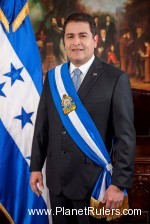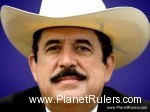Xiomara Castro, President of Honduras (elected Nov 28, 2021 with 51.1% of the vote)
 Iris Xiomara Castro Sarmiento (born 30 September 1959) is a Honduran politician who is the 56th president of Honduras, in office since January 2022. She is the country’s first female president, having earlier served as first lady during the presidency of her husband Manuel Zelaya.
Iris Xiomara Castro Sarmiento (born 30 September 1959) is a Honduran politician who is the 56th president of Honduras, in office since January 2022. She is the country’s first female president, having earlier served as first lady during the presidency of her husband Manuel Zelaya.
Castro grew up in Tegucigalpa and studied business administration. She married Manuel Zelaya in 1976 and became active in the women’s section of the Liberal Party of Honduras. She became the country’s first lady in 2006 following her husband’s victory in the 2005 presidential election. Castro became involved in the National Popular Resistance Front after the 2009 coup d’état which resulted in the end of her husband’s presidency. Due to her husband’s ineligibility, she was nominated as the presidential candidate of the left-wing Liberty and Refoundation (LIBRE) party at the 2013 election, finishing runner-up to National Party candidate Juan Orlando Hernández and outpolling Liberal candidate Mauricio Villeda. At the 2017 election she was Salvador Nasralla’s running mate, with the ticket narrowly losing to Hernández amidst allegations of irregularities. Castro was ultimately elected to the presidency in 2021, defeating National candidate Nasry Asfura with Nasralla as her running mate. She is the first president from outside the country’s two-party system since democracy was restored in 1982.
Source: https://en.wikipedia.org/wiki/Xiomara_Castro
Juan Orlando Hernández, Former President of Honduras (since Jan 27, 2014)

Juan Orlando Hernández Alvarado was born on October 28, 1968 in the city of Gracias, Lempira, in the village of Río Grande. He studied at the National Autonomous University of Honduras where he became a graduate in Law and Social Sciences notary, lawyer. He also earned a Master’s degree in Public Administration with emphasis on the United States legislative.
While studying in UNAH, Juan Orlando was actively involved in university politics to become President of the Law Students Association, 1988 and 1989 In 1990 his brother, Marco Augusto took the First Secretary of the Legislature and He decided to call him to be his executive assistant during this period and began to relate to the National Party.
As a professional law, Hernandez has been a member of various law firms and Professor of Constitutional Law at the Faculty of Law and Social Sciences of the National Autonomous University of Honduras.
In the 1997 election, he defeated first Liberal MP for Lempira.Durante his second legislative term, he was elected First Secretary of the Board, a position from which he promoted innovative measures of transparency in the legislative management. During his tenure the Congress website was created as a tool to bring the Legislature to the people.
In January 2010, the plenary of the National Congress elected Juan Orlando Hernández Alvarado, as the provisional president of the Board of Directors of the state power. Congress before leaving to pursue his presidential campaign, Hernandez introduced a bill to create Integral Unity Government Takes Special Response Security (Tigers).
Ana Hernandez is married to Rosalinda Garcia and has fathered four children: Ivonne María, Juan Orlando, Ana Daniela and Isabela.
Source: http://juanorlando.com
Porfirio Lobo, Former President of Honduras (since Jan 27, 2010)
Porfirio Lobo Sosa, known familiarly as “Pepe” Lobo, born in Trujillo on December 22, 1947, studied at Miami, United States, where between 1966 and 1970 she studied business administration, and conduct studies in economics and politics . Leader of National Party of Honduras, Lobo is the winner of the last elections in Honduras.
Porfirio Lobo Sosa lost in the previous election by 73 000 votes against the now deposed Manuel Zelaya Rosales, one of the closest margins in presidential history.
Despite its rural training as one of the largest producers of basic grains in Central America, Lobo Sosa graduated bachelor of arts and sciences in high school in the capital San Francisco and then take out the BS in Business Administration in Coral Gables, United States together. Also took courses in political Patrice Lumumba University in Russia.
Today is 61 and has three children with Rosa Elena. He also had two more marriages and more than five children, all grew under its protection and support. In his childhood his family moved to Juticalpa, where his father, Porfirio Lobo, one of the largest farmers, settled their domains. A part of the policy, “Pepe” is to craft a farmer, rancher and karate.
Public function has also held positions and the last was the president of the National Congress between 2002 and 2006. “Pepe” was the candidate Security Minister Ricardo Maduro, but as Congress failed most of candidates to preside over Jorge Carranza and Luis Cocenza, Pepe did the third party, who brought together the benches.
But before he had been a Member of Congress and the Callejas administration manager of the now defunct Cohdefor. In the meantime continues to be the manager of the Hacienda “the Pale” in Juticalpa.
In politics since 1967, at 20 years, until 1970 was president of the Nationalist Youth of Olancho, then until 1972 was chairman of the Local Committee Juticalpa, from 1986 to 1994 he was the chairman of the departmental chairman from 1990 to 1995 the National Party Convention; from 1999 to 2001 conventional Olancho, and then president of the National Party Central Committee.
He was a member of the Campaign Committee from 2001-2006 Ricardo Maduro Joest, and alternate deputy to Parlacén 2002 to 2006. In the social and human rights “Pepe” was given by organizations such as the CODEH in Olancho, in the eighties.
José Manuel Zelaya Rosales, Former President of Honduras
José Manuel Zelaya Rosales, also known as Mel Zelaya, (born September 20, 1952) has been the President of Honduras since January 27 2006. On November 27, 2005, as the Liberal Party of Honduras (PLH) candidate he beat the National Party of Honduras (PNH’s) Porfirio Pepe Lobo in the presidential election, replacing Ricardo Maduro as President of Honduras on January 27, 2006 as the PLH’s 5th President in the national stadium in Tegucigalpa in front of 250 dignitaries, including leaders from other countries. His presidency has been markedby a sense of fragility, especially as the PLH do not hold a majority in the Congress, and by the attempt to hold a Licitacion Internacional (International bidding) to obtain cheaper oil, something many observers see as putting him on a collision course with the United States.
Background
Zelaya was born the eldest of four children in Catacamas, Olancho into a family with a notable political history. He has a brother called Carlos, while his mother has been described as his best campaigner. He attended the public National Honduran University (UNAH), but did not graduate, engaging instead in business activities, and specifically timber and cattle. He is a landowner in Olancho (a Department in Honduras) who has worked his own property as a rancher. In June 1975 his family was suspected of involvement in the murder of two priests on their land in Olancho, one from the United States and the other from Colombia though Zelaya has always strongly denied any involvement.
Political career
He joined the PLH in 1970 and became active a decade later. He was a deputy in the National Congress 3 consecutive times between 1985 and 1998. He held many positions within the PLH and was Minister for Investment in charge of the Honduran Social Investment Fund (FHIS) in a previous PLH government. During the government of Carlos Roberto Flores Zelaya introduced an Open counties programme to decentralise decision making and return power to the local communities. He used both the official division according to Municipality and another method which categorised people according to their indigenous or traditional communities, with said categorisation creating 297 different groups and he is planning to revive this scheme once he becomes President.
During the election campaign Zelaya promised to double police numbers from 9,000 to 18,000. He also promised to initiate a programme of re-education amongst the Mara Salvatrucha gangs. In this question his approach was very different from that of his main rival Pepe Lobo, who advocated the death penalty for these groups of delinquents, leading the Honduran media to describe the country as having chosen reconciliation over confrontation.
Presidency
George W. Bush and Manuel Zelaya greet each other before meeting, Monday, 18 Sept. 2006, in New York.
His government has been described as fragile and while he is considered a good leader by some of his followers, the problems his government is facing from delinquency, corruption and poverty are overwhelming. The dominant theme of his government has been the bidding process organized by the government to try and reduce the cost of petroleum in Honduras. The cancelling of all visa applications on Friday June 16, 2006 by the United States Embassy, although ostensibly for a case of corruption involving the Honduras Migration, the Registro Nacional de las Personas (People National Registry Office), which issues the National Identification Card, has been seen by many as observers as a way of the US government to try and pressure Honduras into not developing closer relations with Venezuela and its President Hugo Chávez. The US Embassy in Honduras renewed the process of appointments for visa applications on Monday June 26, 2006. As October 27, 2006 the process of appointments for visa applications was again suspended indefinitely and later the process was resumed again.
A ten-day strike from August 1 to August 10, 2006, by elementary, middle school, and high school teachers demonstrated that his ability to govern is very limited. This prolonged strike was solved after several days and nights of dialogue between the educators’ leaders and several cabinet members and financial analysts.
In the first year of Zelaya’s presidency, several cabinet members have quit their jobs protesting over the President’s leadership style and skills. In addition, in December of 2006 an evaluation of all the Ministries and their head Ministers took place. This evaluation was based on passing and non-passing grades. Several members of Zelaya’s cabinet questioned such evaluation and eventually led to the resignation of the Minister of Education and the replacement of other members of his cabinet. There has also been national concern about who really runs the country, him or his political party. This question is raised after so many public appearances with Patricia Rodas (President of PLH), even though she doesn’t have a job with the government.
He is married to Xiomara de Zelaya, who is now the first lady of Honduras.



